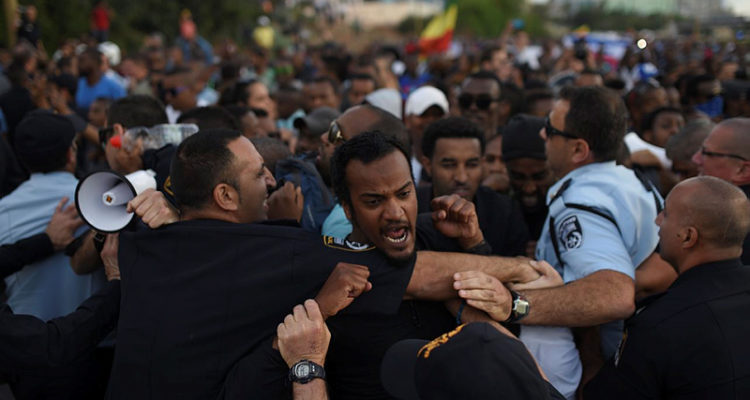Members of the Ethiopian-Israeli community are protesting against alleged discrimination.
By David Jablinowitz, World Israel News
Police and organizers are urging calm as Israelis of Ethiopian background prepare to demonstrate on Wednesday afternoon to protest the deadly shooting by police of an Ethiopian-Israeli man earlier in the month.
Yehuda Biadga, 24, was killed January 18th in Bat Yam, where he lived. Police said that he had charged towards them with a knife. His family said that he had been suffering from a post-traumatic stress disorder and accused police of using excessive force.
Police have granted a permit for the protest to begin at 3 p.m. at the Azrieli complex in Tel Aviv. From there, marchers are to proceed to Rabin Square.
The Ethiopian community has held demonstrations in the past, accusing the Israeli establishment, including police, of discrimination.
Police deny that the killing of Biadga had anything to do with the color of his skin. They say they are dispatching thousands of officers to guard the event. Tens of thousands of demonstrators are expected to take part.
At a news conference, organizer Shahar Molla maintained that the protest is justified. He argued that the mass demonstrations which took place in 2015 against police discrimination did not result in the promised changes.
“Every day we experience additional incidents of violence against our youth,” he said.
He added that organizers have called for a peaceful demonstration. “We are cooperating with the police; the protest will be civilized and organized,” said Molla.
Another organizer, Elias Inbram, charged that police use excessive violence against other Israelis as well, and that it is not an exclusively Ethiopian-Israeli problem.
Activists are demanding independent investigations into what they say are a number of incidents of police violence, including two other cases in Bat Yam which involved a shooting and a beating by members of the force.
Public Security Minister Gilad Erdan said that he has acceded to the request of Tebeka, an Ethiopian-Israeli advocacy organization, and ordered all police officers assigned to guard Wednesday’s demonstration to wear body cameras “to facilitate appropriate protest and to encourage moderation and transparency.”
The wide gaps between Ethiopian and Western culture have made acclimation into Israeli society even more difficult than for other immigrants to Israel, though voices have been heard from the current generation of Ethiopians who were born in Israel that they, too, are not always treated equally.




